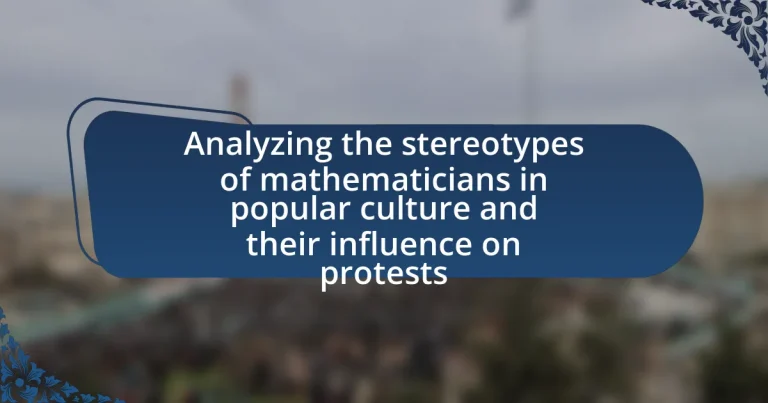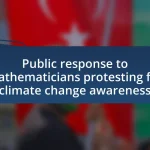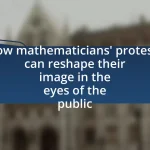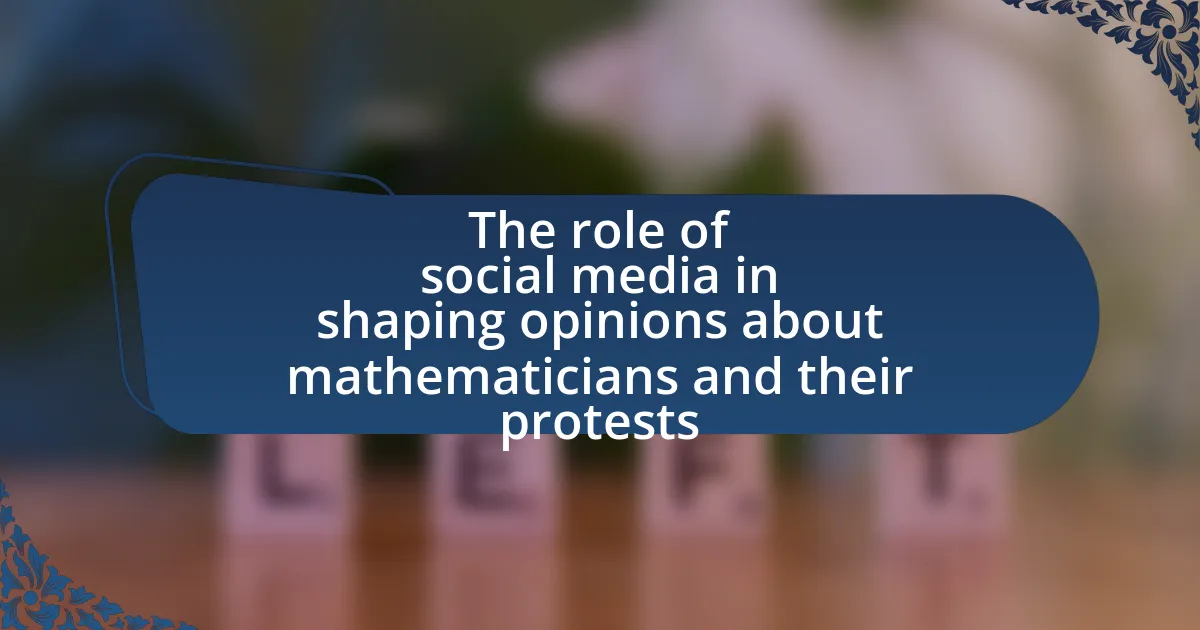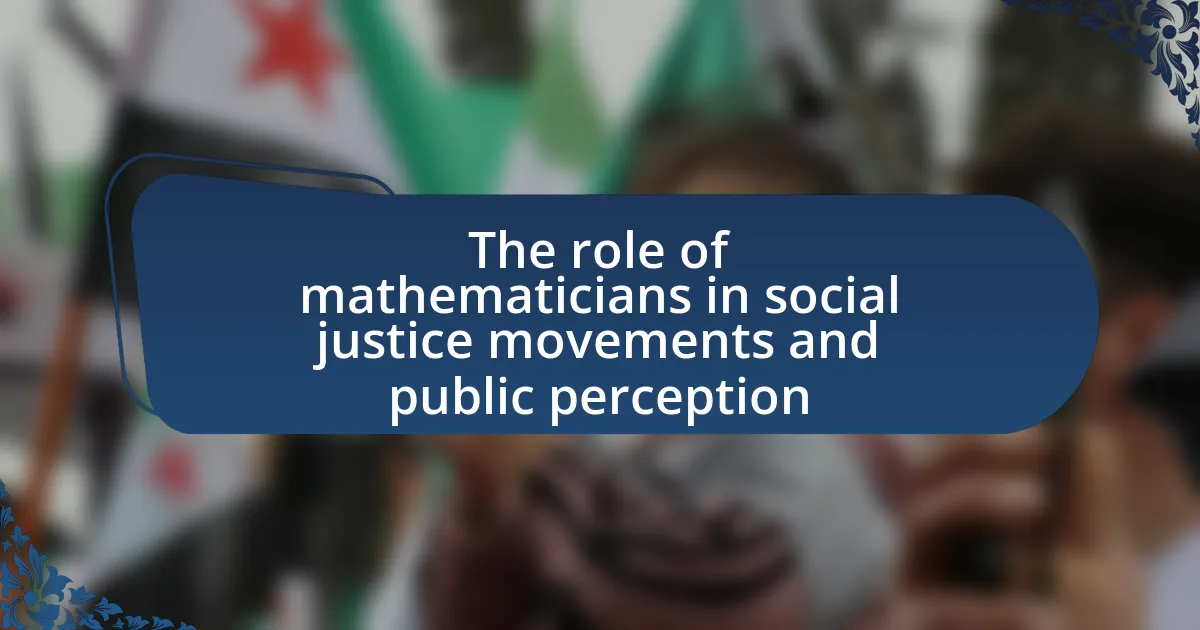The article examines the common stereotypes of mathematicians as portrayed in popular culture, highlighting their depiction as socially awkward and overly intellectual individuals. It discusses how these stereotypes manifest in films and television, influencing public perception and recruitment into mathematics. The article also explores the impact of these stereotypes on students’ confidence and aspirations in STEM fields, as well as their role in shaping societal attitudes towards mathematics. Additionally, it addresses how these misconceptions affect the credibility of mathematicians in social movements and offers practical steps to challenge these stereotypes.
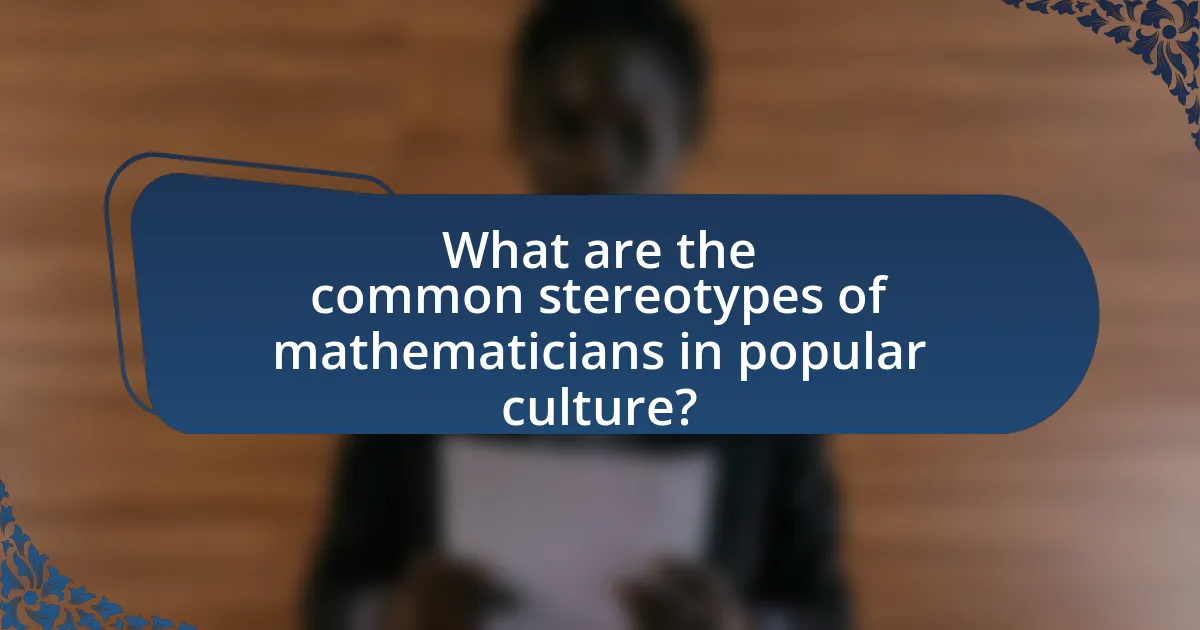
What are the common stereotypes of mathematicians in popular culture?
Common stereotypes of mathematicians in popular culture include the portrayal of them as socially awkward, introverted individuals who are obsessed with numbers and formulas. This depiction often emphasizes their lack of social skills and a narrow focus on mathematical concepts, suggesting they are disconnected from everyday life. For instance, films and television shows frequently depict mathematicians as eccentric geniuses, reinforcing the idea that they are brilliant yet socially inept. Research by the American Mathematical Society highlights that these stereotypes can lead to misconceptions about the profession, affecting public perception and interest in mathematics.
How do these stereotypes manifest in films and television?
Stereotypes of mathematicians manifest in films and television through exaggerated portrayals of their personalities, behaviors, and social interactions. For instance, mathematicians are often depicted as socially awkward, introverted individuals who prioritize logic over emotion, as seen in characters like Sheldon Cooper from “The Big Bang Theory.” This representation reinforces the notion that mathematicians lack social skills and are disconnected from everyday life. Additionally, films like “A Beautiful Mind” present mathematicians as eccentric geniuses, emphasizing their brilliance while often neglecting their emotional depth and personal struggles. Such portrayals can influence public perception, leading to a narrow understanding of mathematicians and potentially affecting their representation in educational contexts and societal discussions.
What specific traits are often attributed to mathematicians in these media?
Mathematicians in media are often attributed traits such as eccentricity, social awkwardness, high intelligence, and obsessive focus on their work. These portrayals frequently depict them as individuals who prioritize logic and problem-solving over social interactions, reinforcing the stereotype of the “mad scientist” or the “absent-minded professor.” For instance, characters like Sheldon Cooper from “The Big Bang Theory” exemplify these traits, showcasing a lack of social skills alongside exceptional mathematical ability. Such representations can influence public perception, leading to a narrow understanding of mathematicians as solely intellectual figures, rather than well-rounded individuals.
How do these portrayals compare to real-life mathematicians?
Portrayals of mathematicians in popular culture often exaggerate traits such as eccentricity, social awkwardness, and genius, which do not accurately reflect the diversity and collaborative nature of real-life mathematicians. For instance, while fictional characters like Sheldon Cooper from “The Big Bang Theory” embody extreme stereotypes, actual mathematicians often work in teams and engage in social interactions, as evidenced by the collaborative efforts seen in research institutions and academic conferences. Furthermore, studies show that the majority of mathematicians come from varied backgrounds and possess a range of personalities, contradicting the narrow archetypes presented in media.
Why do these stereotypes persist in society?
Stereotypes persist in society due to their reinforcement through cultural narratives and media portrayals. These stereotypes, particularly regarding mathematicians, are perpetuated by films, television shows, and literature that often depict them as socially awkward or overly intellectual. Research indicates that repeated exposure to these portrayals shapes public perception, leading to a cycle where stereotypes are accepted as truths. For instance, a study published in the journal “Psychological Science” found that media representations significantly influence individuals’ beliefs about various professions, including mathematics, thereby solidifying existing stereotypes.
What cultural factors contribute to the reinforcement of these stereotypes?
Cultural factors that contribute to the reinforcement of stereotypes about mathematicians include media representation, educational practices, and societal expectations. Media often portrays mathematicians as socially awkward or eccentric, which shapes public perception and reinforces these stereotypes. For instance, films and television shows frequently depict mathematicians as introverted geniuses, leading audiences to internalize these traits as typical. Educational practices, such as the emphasis on standardized testing and the portrayal of mathematics as a difficult subject, can further entrench the idea that only certain individuals possess mathematical talent. Societal expectations, including gender norms that discourage women from pursuing STEM fields, also play a significant role in perpetuating stereotypes, as evidenced by the underrepresentation of women in mathematics-related professions. These cultural factors collectively sustain and amplify the stereotypes surrounding mathematicians in popular culture.
How do educational systems influence public perceptions of mathematicians?
Educational systems significantly shape public perceptions of mathematicians by framing the narrative around mathematics education and its practitioners. For instance, curricula often emphasize the abstract and theoretical aspects of mathematics, which can lead to stereotypes of mathematicians as socially awkward or disconnected from practical applications. Research indicates that students’ experiences in mathematics classes, including the portrayal of mathematicians in textbooks and media, contribute to these perceptions. A study by the American Mathematical Society found that negative stereotypes can discourage students from pursuing mathematics, reinforcing the image of mathematicians as elitist figures rather than accessible professionals. Thus, the educational environment plays a crucial role in forming societal views on mathematicians, influencing both interest in the field and the stereotypes that persist in popular culture.
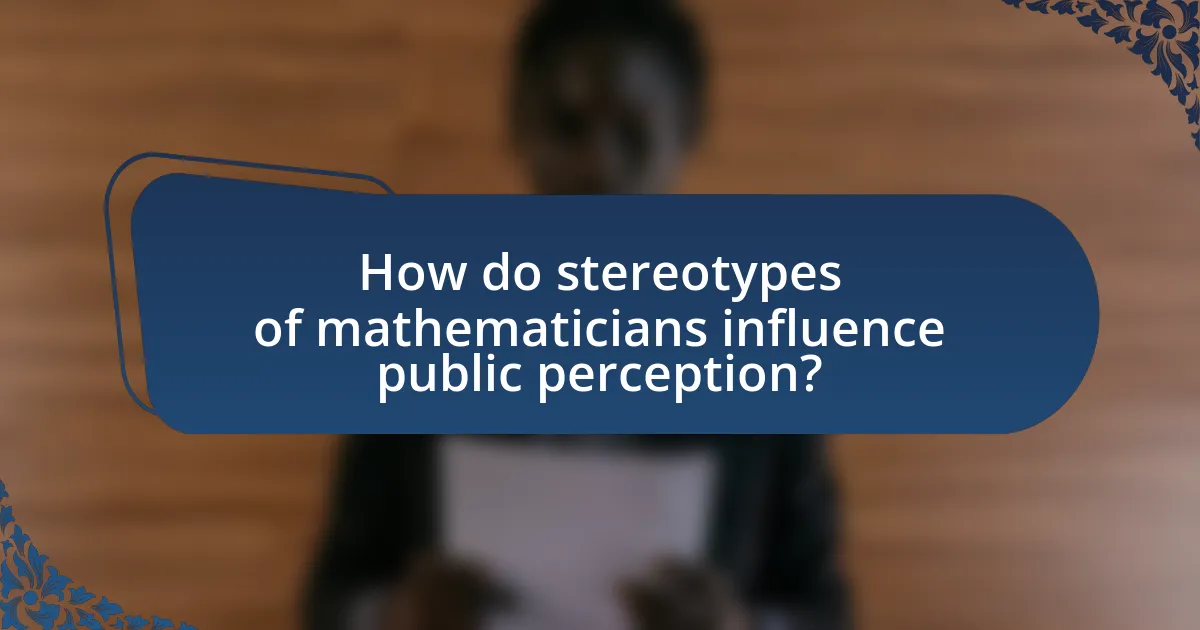
How do stereotypes of mathematicians influence public perception?
Stereotypes of mathematicians significantly influence public perception by reinforcing the notion that they are socially awkward, overly intellectual, and disconnected from everyday life. This perception can lead to a lack of appreciation for the field of mathematics, as individuals may view mathematicians as unapproachable or irrelevant to practical problems. Research indicates that these stereotypes can deter students from pursuing mathematics, as they may feel that they do not fit the mold of a “typical” mathematician. For instance, a study published in the journal “Psychology of Women Quarterly” found that negative stereotypes about mathematicians can discourage female students from engaging with the subject, thereby perpetuating gender disparities in STEM fields.
What impact do these stereotypes have on the recruitment of students into mathematics?
Stereotypes about mathematicians significantly hinder the recruitment of students into mathematics. These stereotypes often portray mathematicians as socially awkward or overly intellectual, which can deter potential students who may not identify with these traits. Research indicates that negative stereotypes can lead to a lack of interest and confidence in pursuing mathematics, particularly among underrepresented groups. For instance, a study published in the journal “Psychological Science” found that when students are exposed to negative stereotypes about their abilities in mathematics, their performance and interest in the subject decline. This evidence underscores the detrimental impact of stereotypes on student recruitment in mathematics.
How do stereotypes affect the confidence of students pursuing mathematics?
Stereotypes negatively impact the confidence of students pursuing mathematics by perpetuating beliefs that certain groups are inherently less capable in the subject. Research indicates that when students are exposed to stereotypes suggesting that their gender or ethnicity is associated with lower mathematical ability, their performance and self-efficacy in mathematics decline. For example, a study by Steele and Aronson (1995) demonstrated that African American students performed worse on math tests when reminded of their race, highlighting the detrimental effects of stereotype threat. This phenomenon leads to increased anxiety and decreased motivation, ultimately hindering their academic success in mathematics.
What role do stereotypes play in shaping career aspirations in STEM fields?
Stereotypes significantly influence career aspirations in STEM fields by shaping perceptions of who can succeed in these areas. For instance, the stereotype that STEM careers are predominantly suited for males can discourage women and minorities from pursuing these paths, leading to a lack of representation. Research by the American Association of University Women indicates that girls are less likely to pursue STEM careers when they perceive these fields as male-dominated, which reinforces the stereotype and perpetuates gender disparities. Additionally, stereotypes about intelligence and ability can create self-doubt among underrepresented groups, further impacting their aspirations and participation in STEM.
How do these stereotypes affect the general public’s understanding of mathematics?
Stereotypes about mathematicians, such as the belief that they are socially awkward or overly intellectual, negatively impact the general public’s understanding of mathematics by creating barriers to engagement and interest. These stereotypes can lead individuals to perceive mathematics as an exclusive domain, discouraging participation and fostering anxiety around the subject. Research indicates that negative stereotypes can diminish self-efficacy in mathematics, particularly among underrepresented groups, as shown in studies like “Stereotype Threat and Women’s Math Performance” by Steele and Aronson, which highlights how stereotype threat can hinder performance and interest in mathematics. Consequently, these stereotypes contribute to a cycle of misunderstanding and disengagement from mathematics in society.
What misconceptions arise from the portrayal of mathematicians in popular culture?
Misconceptions arising from the portrayal of mathematicians in popular culture include the belief that they are socially inept, eccentric, and solely focused on abstract theories without practical applications. This stereotype is perpetuated by films and television shows that often depict mathematicians as reclusive geniuses who struggle with interpersonal relationships, such as the character of Sheldon Cooper in “The Big Bang Theory.” Additionally, popular culture frequently emphasizes the idea that mathematicians possess an innate talent for numbers, ignoring the extensive education and hard work required to excel in the field. Research indicates that these portrayals can lead to a lack of interest in mathematics among students who do not identify with these narrow representations, ultimately affecting their engagement with the subject.
How does the media’s representation of mathematicians shape societal attitudes towards math?
The media’s representation of mathematicians significantly shapes societal attitudes towards math by often portraying them as socially awkward or eccentric individuals, which can lead to negative stereotypes about the subject itself. For instance, films and television shows frequently depict mathematicians as geniuses who struggle with interpersonal relationships, reinforcing the idea that math is a niche field suited only for a select few. This portrayal can discourage students from pursuing math, as they may perceive it as an isolating and unapproachable discipline. Research by the American Mathematical Society indicates that such stereotypes can contribute to a lack of interest in math among young people, particularly girls and underrepresented minorities, who may feel alienated by these images. Consequently, the media’s framing of mathematicians not only influences individual perceptions but also impacts broader educational trends and societal engagement with mathematics.
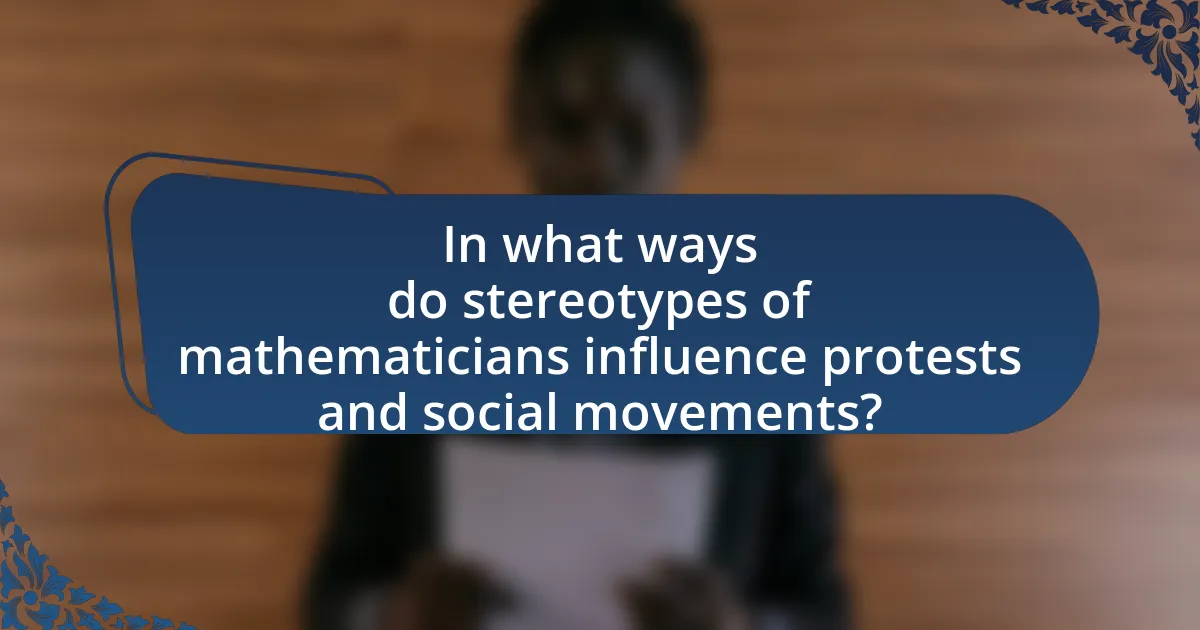
In what ways do stereotypes of mathematicians influence protests and social movements?
Stereotypes of mathematicians influence protests and social movements by shaping public perceptions of expertise and authority in scientific discourse. These stereotypes often portray mathematicians as socially awkward or disconnected from real-world issues, which can lead to skepticism about their contributions to social causes. For instance, when mathematicians engage in activism, their credibility may be undermined by the stereotype that they lack practical understanding, potentially diminishing the impact of their arguments on issues like climate change or education reform. Research indicates that public trust in experts is crucial for the effectiveness of social movements; thus, negative stereotypes can hinder collaboration between mathematicians and activists, ultimately affecting the mobilization of support for various causes.
How have mathematicians been portrayed in protests related to education and science?
Mathematicians have been portrayed in protests related to education and science as advocates for rationality, critical thinking, and evidence-based policy. During various protests, such as the March for Science in 2017, mathematicians emphasized the importance of scientific literacy and the role of mathematics in understanding complex societal issues, such as climate change and public health. Their participation highlighted the stereotype of mathematicians as logical problem solvers, reinforcing the perception that they contribute significantly to informed decision-making in public discourse. This portrayal is supported by the presence of mathematicians in educational reform movements, where they argue for curricula that prioritize analytical skills and quantitative reasoning, reflecting their commitment to enhancing educational standards and promoting scientific integrity.
What messages are conveyed through the participation of mathematicians in these protests?
The participation of mathematicians in protests conveys messages of solidarity, intellectual engagement, and the importance of rational discourse in societal issues. By joining these movements, mathematicians highlight the relevance of their analytical skills in addressing complex social problems, such as inequality and climate change. Their involvement challenges stereotypes that portray them as detached or solely focused on abstract concepts, demonstrating that they are active participants in societal discourse. This engagement is supported by instances where mathematicians have used their expertise to advocate for data-driven policies, thereby reinforcing the idea that mathematics can inform and enhance public understanding of critical issues.
How do stereotypes affect the credibility of mathematicians in social movements?
Stereotypes significantly undermine the credibility of mathematicians in social movements by perpetuating the notion that they lack social awareness or emotional intelligence. This perception can lead to the dismissal of their contributions, as seen in instances where mathematicians advocating for social change are viewed as out of touch or overly analytical, rather than empathetic or relatable. Research indicates that stereotypes can create barriers to effective communication and collaboration, as individuals may prioritize emotional resonance over logical arguments, thereby marginalizing the voices of mathematicians in critical discussions.
What role do mathematicians play in advocating for social change?
Mathematicians play a crucial role in advocating for social change by applying quantitative analysis to social issues, thereby influencing public policy and community initiatives. They utilize statistical methods to analyze data related to social problems, such as income inequality, education disparities, and healthcare access, providing evidence-based insights that can drive reform. For instance, mathematicians have contributed to the development of models that predict the impact of policy changes on various demographics, which has been instrumental in shaping discussions around social justice. Their work often intersects with activism, as seen in movements that leverage mathematical modeling to highlight systemic issues, demonstrating the power of data in advocating for equitable solutions.
How can mathematicians leverage their expertise to address societal issues?
Mathematicians can leverage their expertise to address societal issues by applying quantitative analysis and modeling to inform policy decisions and social programs. For instance, mathematicians utilize statistical methods to analyze data related to public health, education, and economic disparities, which can lead to evidence-based solutions. A notable example is the use of mathematical modeling during the COVID-19 pandemic, where mathematicians contributed to predicting the spread of the virus and evaluating the impact of interventions, thereby guiding public health responses. This demonstrates how mathematical expertise can directly influence societal outcomes by providing critical insights that shape effective strategies for addressing complex challenges.
What strategies can mathematicians use to combat negative stereotypes in activism?
Mathematicians can combat negative stereotypes in activism by actively engaging in public discourse and showcasing their contributions to social issues. By participating in community outreach programs, mathematicians can demonstrate the relevance of their work to real-world problems, thereby challenging the perception that they are detached or solely focused on abstract concepts. For instance, initiatives like Math for America highlight how mathematicians can apply their skills to improve education and public policy, effectively countering stereotypes of being socially inept. Additionally, collaborating with diverse groups in activism can help mathematicians present a more inclusive image, fostering a narrative that emphasizes their commitment to societal change rather than reinforcing negative stereotypes.
What practical steps can be taken to challenge stereotypes of mathematicians?
To challenge stereotypes of mathematicians, educational institutions can implement diverse representation in mathematics curricula and promote role models from various backgrounds. Research indicates that exposure to diverse mathematicians can positively influence students’ perceptions and aspirations in the field. For instance, the National Science Foundation’s report on STEM education highlights that inclusive teaching practices lead to improved engagement and interest among underrepresented groups. Additionally, organizing community outreach programs that showcase mathematics in real-world applications can demystify the subject and present mathematicians as relatable figures. These practical steps can effectively counteract the narrow stereotypes often portrayed in popular culture.
